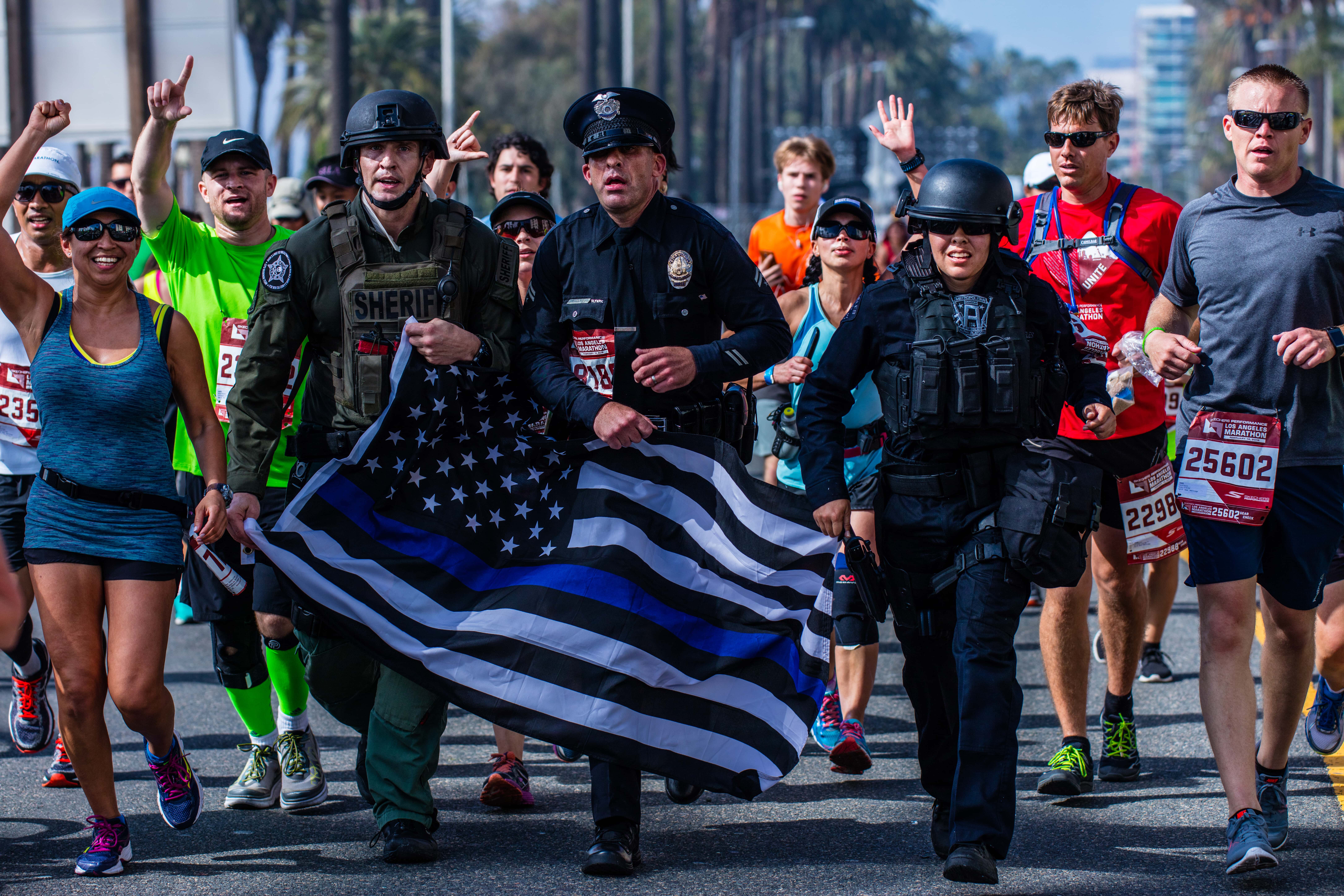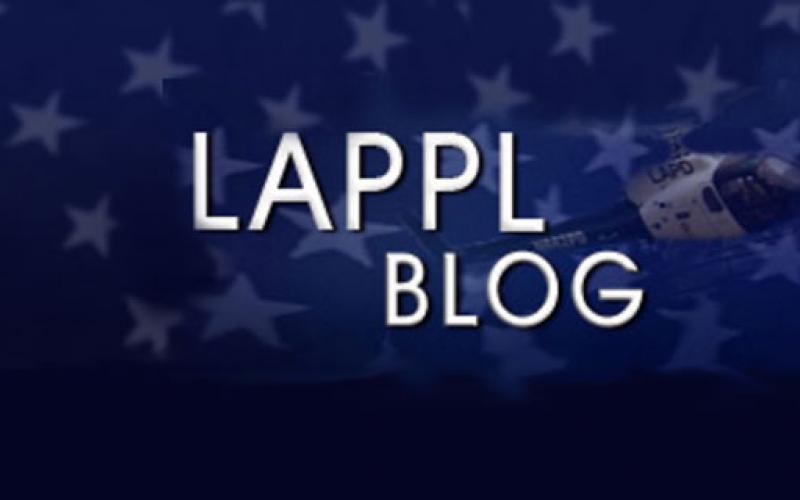The following editorial, submitted by Lt. Shannon Paulson, Central Area, will appear in the April Thin Blue Line. It is being posted on the League Blog with her permission.
I monitored with interest the recent exchange of comments on the LAPPL blog site regarding support of the public employees demonstrating in Wisconsin. I must accept partial responsibility for what followed, as it was I who innocently contacted the Board of Directors and queried as to whether we would be sending any symbol or signal of support to the teachers, police officers, firefighters and other public employees demonstrating in Wisconsin in an effort to protect their “workers’ rights.”
First, in the interest of full disclosure, I must admit a tendency to very pro-actively support unions. I have been known to buy donuts and pizza for those on the picket line and my family did actually drive an extra 15 minutes each way to the closest Stater Brothers when the workers at Ralphs and Vons were on strike. Call me a pinko-commie-marxist-socialist wackjob, but I tend to balance my pro-law enforcement, pro-military, pro-death penalty, pro-victim’s rights stance with a large dose of pro-union. I am one of a shrinking number of members of the League who actually remembers “Blue Thunder,” our demonstration during the mayor’s speech at Ebell Theater, the march on City Hall, and other unspecified “labor actions” that occurred in 1993 after our own membership went two years without a contract and the City made an offer of an additional two years of zero and zero. This when we did not even rank in the top 100 pay scale for law enforcement officers in the state and when it became steadily clear the money was available to the City to provide us the well deserved raise.
So, after the legislation to outlaw collective bargaining by public employees was proposed in Wisconsin, an action which to me has no foundation in economics, it appeared logical to me for our League to step up in support of those on the vanguard of what appeared to be the beginning of a national effort to eradicate the power and influence of unions across the country. The comments and opinions that followed in the LAPPL blog were at times entertaining, enlightening and thought provoking. Others were downright disappointing and prompted me to formulate a response.
It is clear there is an unfortunately sizeable portion of our membership (and our retirees) who do not have a full understanding of the function and mandate of the Los Angeles Police Protective League. In case there is anyone left who is not absolutely clear on this – the Los Angeles Police Protective League is a LABOR UNION! I say this because one comment blatantly asked, “Since when did the League become a union?” Other comments, while not as blatant, were clearly speaking from a similar perspective. Some members clearly need to refresh their knowledge base by reading the banner noted on every LAPPL correspondence and prominently posted on the website and in the League offices: “The mission of the Los Angeles Police Protective League is to vigilantly protect, promote, and improve the working conditions, legal rights, compensation and benefits of Los Angeles Police Officers.” Now let me read to you the Miriam-Webster definition of a labor union: “an organization of workers formed for the purpose of advancing its members' interests in respect to wages, benefits, and working conditions.”
Many blog comments raised the issue that the nation is in economic turmoil and the unions and workers need to accept some of the weight of that. This is undeniably correct. Despite most union members having no part in the causal factors of the national situation, it is likely we all will have to share in the burden. Many of our officers have already felt the impact on their families with spouses who have been laid off, received furlough days, etc. But the fact of the matter is the Wisconsin public service unions had already agreed in theory to both pay cuts and increases in their personal contributions to pension plans. They did, however, refuse to willingly surrender their legislatively protected access to collective bargaining – that became the sticking point. Let us be honest – the elimination of collective bargaining has nothing to do with economics and everything to do with union-busting. This is something each and every League member should be concerned with.
While it would be ideal for members of society to always treat one another with compassion and respect, human nature unfortunately dictates this is not always the case. Thus, society created laws and formed law enforcement agencies and criminal and civil courts to safeguard people’s lives and protect their personal, property and business interests. Similarly, it would be ideal if public and private employers could be depended on to consistently treat their employees with fairness and decency. But again, this is not always the case. So society, at the behest of unions, enacted laws to require fair wages, regulate working conditions and ensure reasonably safe working environments. Call it socialist, but it was “activist unions” that garnered for you things like Workers Compensation, the Fair Labor Standards Act which guarantees your overtime and timely compensation of wages, family medical leave and such unimportant trivialities as the Public Safety Officers’ Bill of Rights. (On a sidebar note, some of you may be fascinated to learn that California was the first state to pass legislation specifically protecting the unique employee rights of police officers. The largest supporter of the California POBR was the ACLU and the primary sponsor of the bill in 1976 was the Los Angeles Police Protective League.)
Further, it is thanks to unions that you are not fired after being injured in the line of duty and unable to immediately return to work. It is thanks to unions that you will receive the necessary medical attention for that injury suffered in the line of duty. It is thanks to unions that you do not get paid partially in tokens which can be spent only at the “company store” where prices for goods are twice or three times the going rate. It is thanks to unions that laws exist protecting your teenage children from working in warehouses where fire exits are chained and blocked. Finally: It is not a coincidence that the formation and rise in the membership and activism of labor unions in the United States in the early part of the last century directly corresponds with the rise in the size of the middle class – one begat the other.
It was our union, which you refer to (sometimes fondly, sometimes not) as the “the League,” that has acquired for you in the past, and maintained for you even in today’s economy, your vacation time, your medical and dental subsidies, your uniform allowance, your compressed work schedule, your rate of pay and has negotiated reasonable modifications to LAFP pensions. This was accomplished largely because of the rules regarding collective bargaining. Again, contrary to some misperceptions, and undoubtedly some intentional misinformation, collective bargaining does not require employers to overpay or provide benefits which cannot be afforded. It does, however, require them to negotiate in good faith and give fair and reasonable compensation and benefits according to such considerations as the City’s economic viability, the industries prevailing wage and cost of living in the area being serviced. Do not be fooled, if there is no money to be had, no money is awarded. Collective bargaining can just as easily result in cuts to pay and benefits as it can to increases if the current environment requires it. It simply requires good faith participation by both parties and a determination by an objective arbiter if impasse is reached.
A couple people made the isolationist-leaning comment on the blog that we should just “stay out of it.” They attempt to legitimize this by pointing out that police and fire unions were exempt from the cuts being proposed, or that we in California did not need to concern ourselves with what was happening in Wisconsin. Well, even the police officers and firefighters in Wisconsin see the writing on the wall – they are marching in solidarity with other public employees. Other bloggers went so far as to say “it’s not our fight.” So I’m forced to ask: How many of us have been disheartened by hesitant witnesses to serious crime who refuse to get involved and state “it’s none of my business” or “it’s not my concern.” And how many of us have tried to convince those same witnesses it is in the best interest of the neighborhood and the community that they do get involved? That the next time around it could be themselves or their loved one and how would they then feel if none of their neighbors stepped forward on their behalf. I would argue the same logic can be applied to our current union circumstances.
I observed in this dialogue a symptom of a larger problem within our membership: a clear misperception of the League’s fundamental reason for existence. As a long time League delegate this has been a rising concern of mine. Contrary to what some officers may prefer or personally believe, the primary function of the League is not to advocate for a stronger criminal justice system, the three strikes law, the death penalty or other political or social issues traditionally of interest to law enforcement officers. The individuals elected to the Board of Directors of our League have a duty to fill their role as union leaders first and foremost. Their primary responsibility is to fulfill the mission of the League: to safeguard, and when possible improve, the working conditions, legal rights, compensation and benefits of the membership. No decision they make or action they take on our behalf should be contrary to, or prioritized above, this goal.
For instance, the political candidates you see the League endorse are determined primarily by those candidates’ support and stand on labor issues. Yes, this frequently means those candidates are leaning to the left in the political spectrum. But, to do anything else, to base endorsements on any other issues, would be an abdication of the League’s duty to the membership. Take for instance the National Rifle Association. The NRA’s fundamental duty is to take political action to protect the rights of gun owners. To base their political endorsements on any other factor would be disingenuous to their NRA membership. Similarly, the League, and every other labor union, has a responsibility to prioritize their actions based on labor issues. You may not always agree with these endorsements depending on your individual social, economic or political voting priorities, but again, this is the League’s mission.
Please understand I am not trying to say the LAPPL Board of Directors must always have your unquestioning support or agreement, or that they are not subject to challenges by the membership. I will be the first one to admit that I have not always agreed with every action the Board has taken or statement they have made. After over 15 years as a delegate, I will admit to frequently being the first one to question the Board on several issues – I consider it my responsibility as a delegate and a member to hold my elected representatives accountable. What I am saying is that when we do review and pass judgment on the actions of our elected union representatives, it must be done in the proper context, with a proper understanding of their true mandate and responsibilities.
Shannon Paulson
League Delegate
Central Area











